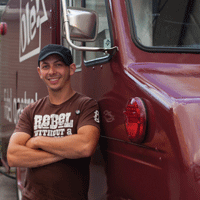When the weather warms up, and there’s no snow in sight, many Canadians start planning their ultimate summertime road trip. Whether it’s a one-day jaunt or a week-long holiday, the adventure is as much about the journey as it is the destination: you cruise with the windows down, bop to a local radio station and make a chip-truck pit stop for a mound of golden, deep-fried potato chunks doused with your favourite fixings.
Most trucks offer traditional toppings, such as gravy, ketchup and malt vinegar, but chances are you won’t find pad-thai trimmings on the menu (think bean sprouts and cilantro). Unless, of course, you’re ordering from Fidel Gastro’s food truck in Toronto. You might find it parked in the financial district, or on campus at The University of Toronto. If you do spot it, prepare to line up with throngs of hungry fans cheering “Olé!”
To be fair, Fidel Gastro’s isn’t exactly a chip truck. Rather, it’s the roving base camp for owner Matt Basile’s Rebel Without a Kitchen Services. His french-fry pad-thai side dish ($6) is a quirky spin on the classic Thai fare, where fries replace rice noodles. Phenomenally popular Cuban-inspired sandwiches are his main squeeze and Basile’s sammies are as cheeky as the company moniker. The Sloppy Jose ($8) is a tasty combination of cola-braised brisket, baked beans and roasted corn aioli, and The Gorgeous Jorge ($8) is a savoury take on PB and J, with peanut-butter pulled pork, bacon jam and pig-skin crackling. His truck, endearingly called Priscilla, after Elvis Presley’s wife, is an extension of what began as a pop-up food company. “Originally I planned to open a small sandwich shop, but the bank wouldn’t lend me money,” Basile says. “One night at a party my friends were going to order pizza, but I started cooking instead. That’s when I realized that maybe what I do is go around and create food experiences.”
That was in October 2011. Soon after, Basile got a booth at the Toronto Underground Market and started using Twitter to plug his brand. “The business blew up,” he says. “By April 2012, we went from doing four jobs a month to doing 22.” In July of last year, the energetic entrepreneur landed his own TV show — a reality television series following his pop-up events — and Priscilla hit the streets a month later when filming began. (You can catch Rebel Without a Kitchen on the Travel and Escape channel). “We bring a lot of energy to what we do,” says Basile, who can often be heard hollering “Ole!” and “Viva la revoluçion!” from inside the truck during service. “I love the truck, but it was very frustrating trying to get licensing sorted out when I launched. It seemed like the city didn’t even know what was going on and that was discouraging.” The harsh Canadian winter is another challenge for Basile. “For me, it’s not a year-round operation. With our weather there’s always a risk of something going wrong, and it’s not safe to drive. Not being available all year can be positive, though. It helps keep the buzz going.”
Basile’s business is buzzing. This spring, he’s opening a bricks-and-mortar home base called Lisa Marie (after Elvis’s daughter, naturally) focused on cicchetti, Venetian-style tapas as well as preserves and marinated meats to go.
“Food trucks are here to stay,” affirms Garth Whyte, Canadian Restaurant and Foodservices Association (CRFA) president. “There are mixed feelings about them, but most restaurant owners support trucks so long as it’s a level playing field. Some restaurateurs are using trucks themselves as a way to diversify. This isn’t about chip wagons anymore.” The CRFA’s 2013 Canadian Chef Survey shows that 60 per cent of chefs said food trucks and street food are hot trends.
Susan Austin is another sophisticated food-truck revolutionary. She and her husband, Scott Austin, along with a team of culinary and marketing professionals, opened Ontario’s first full-service shared commercial kitchen and food-truck commissary in January. Hamilton, Ont.-based Roux Commissary is a 3,600-sq.-ft. facility with ample storage for dry goods and marketing materials, massive refrigeration space and a huge prep area. The Austins are former co-owners of the Gorilla Cheese food truck. When they sold their share of the business to a third partner, they wanted to use their knowledge to help foster the industry. “We like to think of Roux as a culinary incubator. We’re here to support other food entrepreneurs,” Austin says. “There are hardships involved with running a food truck, and space is a big issue. Prep space in a truck is tiny and, in terms of supplies, you can only purchase what you can fit in your truck and your living room.”
Roux isn’t just a place for food trucks — it’s also for culinary entrepreneurs who might be prohibited by start-up costs, such as equipment and space rental. The Roux team consults with clients and assists with running the back-end of the business — bookkeeping, shipping, social media and more — so operators can focus on their food and customers. “A lot of food trucks are run by one or two people. You have to wear many hats, and it’s a heavy workload,” Austin says. She hopes Roux will appeal to some trucks in neighbouring Toronto, where it’s more expensive to park and trickier to operate. “We’ve worked with the city on by-laws and licensing, and Hamilton has set the benchmark in terms of co-operating with food trucks. Other cities, such as Toronto, have fallen short and made no strides in the past two years to enhance the culture.”
While some cities may be at a stand-still with food trucks, others are embracing their local mobile-meal purveyors. In Calgary, a pilot program that started in August 2011 with five trucks — and quickly grew to 40 — will wrap in June 2013. Connie DeSousa, co-owner of Calgary’s Charcut Roast House, is a member of the street-food committee organized by Mayor Naheed Nenshi as part of the pilot. Charcut’s Alley Burger truck is one of the original five. “In June, we’ll approach the Chamber of Commerce to officially change the by-laws regarding food trucks in Calgary,” DeSousa says. “The program has been so successful and the city has been very supportive.” She and members of the committee worked with the mayor to learn about street food and food trucks in other North American cities to build the best program and policies for their city.
Alley Burger got its wheels, so to speak, from a Charcut social-media campaign where the restaurant owners sold burgers out the back door. When 350 people lined up one night, they knew their ingenious idea needed a different vehicle. The truck, a 1981 Chevy, offers the original Alley Burger ($5, small; $8, regular), a pork and roasted-garlic sausage patty dressed with Quebec cheese curds and piri piri aioli as well as The Whole Truck ($6.25 small; $9 regular), a customizable Angus beef burger, and sides such as fries, poutine, soup and salad. “The first year we went through the winter,” DeSousa says. “There are some cracks in the truck, and it gets chilly, so this year we took it off the street for the season. Food trucks are a hard business, and it’s not for everyone. I don’t think it will go out of style, though. The strong brands will survive.”
While a food truck can help build a strong brand, it can also be used to strengthen an existing one. In November 2012, Jack Astor’s held a 12-day food truck event fuelled by social media. “The campaign was designed to promote our new fall menu items. It’s a playful and surprising thing to do and really fits with our brand,” says Larisa Martinez, marketing manager for Jack Astor’s at Burlington Ont.-based SIR Corp. The truck cruised the Greater Toronto Area, visiting Toronto, Burlington, Mississauga and London, and customers using Twitter were encouraged to tweet their location along with the campaign hashtag. Each day, the truck crew would surprise one tweeter by showing up with samples of dishes such as Junk Boat Chicken ($16.96) and One Really, Really Big Meatball ($13.93) for up to 20 people. “It was a lot of fun, and we got tons of buzz online,” Martinez says.
Food trucks are often thought of as grass-roots operations, but they are effective tools for established brands as well. “It’s great that bigger companies are using food trucks,” says Ryan Smolkin, owner of Ajax, Ont.-based Smoke’s Poutinerie, which has three trucks. “It gives credit to the movement and helps weed out people who are in it for the wrong reasons.” When Smoke’s launched its first truck in 2009, it went into storage for the winter months due to lack of demand. In February 2013, that same truck, located in Toronto, was booked for 20 events.
“We’ll do 1,000 servings at an event,” Smolkin says. “The truck is self-sufficient, but it doesn’t have the capacity for all of the prep. We rely on the support of the four walls to be able to do those quantities. Offsite prep space and storage for food and supplies are important operating costs to think about with a food truck. You have to do large volumes if you want to make it successful.” Smolkin also points out high insurance fees and potentially frequent (and possibly extensive) maintenance on older vehicles as additional costs. “Anyone thinking of starting a food truck needs to realize it’s a complicated business,” he says. “You can have a huge negative cash flow when you have to put up big bucks to reserve a spot at an event, sometimes as much as a year in advance. If you end up with bad weather, when it finally comes around, you can have major losses.”
Most of the revenue from Smoke’s Poutinerie trucks comes from non-traditional events, such as private bookings for weddings and golf tournaments. The business is booming, but there are always challenges. “Food safety is one of the most important factors when you’re running a truck,” Smolkin says. “In a restaurant, inspectors might come through a few times a year. With trucks they come through for every single event. You have to be on your game.” The mobile poutineries offer a scaled-down version of the in-store menu, and Smoke’s has another 10 trucks lined up with franchisees across Canada. If you happen to spot one, expect fry fixings such as Quebec cheese curds, pulled pork, double-smoked bacon and gravy ($5.99 to $7.99). Smoke’s might be serving fries, but this is ain’t your typical roadside chip truck.
Keep Reading
Government to Promote Canada with Food Truck in Mexico





















